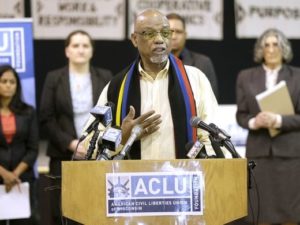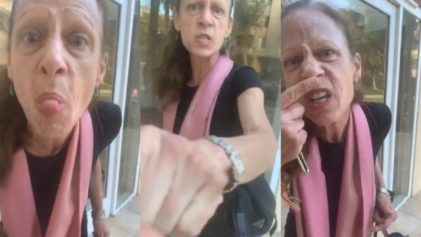
Charles Collins says he’s been stopped by Milwaukee Police multiple times over the past 55 years while living in the city. Photo by Mike De Sisti/Milwaukee Journal-Sentinel
The American Civil Liberties Union of Wisconsin filed a lawsuit on Wednesday, Feb. 22, accusing the Milwaukee Police Department of targeting African-Americans and Latinos for illegal stop-and-frisks without reasonable suspicion.
The suit, filed against the City of Milwaukee, the Fire and Police Commission and Milwaukee Police Chief Edward Flynn, claims that police have routinely violated the constitutional rights of Milwaukee residents by conducting pervasive stop-and-frisks motivated by race/ethnicity. The complaint also pointed to preliminary data showing stark disparities between police stop rates for Blacks and Latinos compared to whites.
The city’s stop-and-frisk “program authorizes MPD officers to stop people without objective and articulable reasonable suspicion of criminal conduct; and to frisk people without reasonable suspicion that the person is armed and dangerous, as required under the Fourth Amendment,” the lawsuit states.
“Under this program, the MPD also conducts pervasive stops and frisks that are motivated by race and ethnicity in violation of the Fourteenth Amendment and Title VI,” it continues.
The civil rights organization went on to argue that Milwaukee’s purported “broken windows” policing strategy includes blanketing specific geographical areas where residents are largely African-American or Latino with “saturation patrols” by MPD officers. During these patrols, officers conduct high volumes of unwarranted stop-and-frisks in the area, according to the complaint. Officers are reportedly also required to conduct a certain number of stops on a routine basis, as dictated by the department’s formal quota system.
Wednesday’s suit was brought by six victims of the stop-and-frisk program on behalf of numerous others who experienced similar encounters with MPD officers, according to the ACLU-Wisconsin website. Each plaintiff is Black or Latino and was illegally stopped and/or searched by officers while engaging in everyday routines, such as running errands, walking home from school or driving to a relative’s house.
While law enforcement officials often tout the invasive tactic as a method to combat crime, the ACLU argued that stop-and-frisk only increases the level of distrust between police and communities of color.
One plaintiff, a 60-year-old secretary named Alicia Silvestre, alleges that police followed her and her then 4-year-old granddaughter into their home without permission, claiming they had proof of heroin use, according to the suit.
Charles Collins, another plaintiff in the case, said he’s been stopped unjustly by police multiple times during the 55 years he’s lived in Milwaukee.
“As a Black man in Wisconsin, I’m edgy when I’m going outside,” said Collins, who’s a veteran. “You should have the freedom to move around freely with no apprehension, no dread.”
On Wednesday, Police Chief Flynn vehemently denied the plaintiff’s claims and asserted that his department has never once used the stop-and-frisk tactic.
“The Milwaukee Police Department has never used the practice of ‘stop and frisk’ nor has there ever been a quota for traffic stops,” Flynn said in a statement. “However, traffic stops in high-crime areas have been proven to reduce the number of nonfatal shootings, robberies and motor vehicle thefts.”
Mike Crivello, president of the Milwaukee Police Association, denied officers conduct stops based on race or ethnicity, adding that the real issue was Flynn’s emphasis on “quantity of work over quality.” Still, this explanation doesn’t explain the significant disparities between rates at which Blacks and Latinos are stopped compared to whites.
In their complaint, ALCU-Wisconsin cited data from TraCS Geocoded Stops recorded between Jan. 1, 2011 and Dec. 31, 2013, revealing that Black Americans comprised 63 percent of those subjected to pedestrian or traffic stops, even though they made up only an estimated 34 percent of the city’s population at the time. The analysis also found that the predicted MPD stop rate for Black civilians was well over twice as high as the predicted stop rate for white civilians. African-Americans also were more likely to be frisked/searched.
“The bottom line is that the data we have so far on this unlawful and massive stop-and-frisk program show that Black and Latino people are far more likely to be targeted for police stops, which raises serious concerns,” said Nusrat Choudhury, lead attorney on the lawsuit.
Flynn maintains that the racial disparities in police stops simply reflect the demographics of victims and perpetrators.


